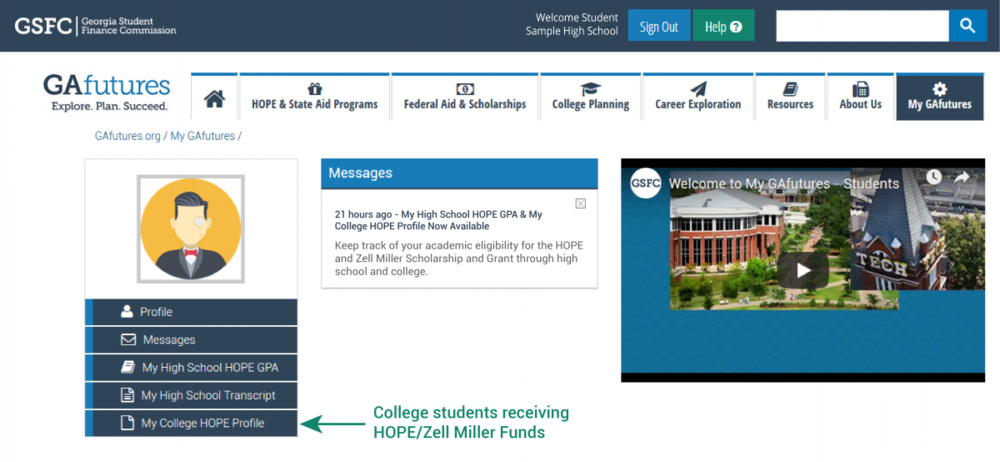
February 2019 Quarterly Newsletter
February is Financial Aid Awareness Month
When it comes to going to college, financial aid can make all the difference. In honor of Financial Aid Awareness Month, we’ve highlighted just a few of the students who earned their postsecondary credentials with the help of one of the financial aid programs GSFC administers for Georgia residents.
At GSFC, it’s financial aid awareness month all year long! Our team strives to educate students planning to go to college about the many financial aid options available and how to access them. We partner with high school counselors and financial aid administrators across the state to help make sure financial barriers don’t prevent students from earning their postsecondary credentials.
Here are just a few award recipients of programs GSFC administers and how financial aid made a difference in their lives.
|
large_Crystal Wright - 302 by 320.jpg

Crystal Wright - The 2018 TCSG GOAL Award winner used the Zell Miller Grant to become a licensed practical nurse. |
Josh McDuffie - A US Army veteran, Josh earned two diplomas thanks in part to the HOPE Grant Josh McDuffie 302 by 320_0.jpg

|
|
Katie Harrison - One of the first Georgians to use the HOPE Scholarship, Katie Harrison graduated college without significant debt. Katie Harrison 302 by 320_0.jpg

|
Amanda_Campbell 302 by 320_0.jpg

Amanda Campbell - Dual Enrollment allowed Amanda Campbell to work towards an Associate’s degree while still in high school. |
Do you know someone who has benefitted from one (or more) of Georgia's state financial aid programs? GSFC is always looking for great stories to share. Complete the form and send it to [email protected].
College Students Can Now Track Their HOPE Eligibility
My College HOPE Profile is a new feature on GAfutures providing college students the opportunity to track their HOPE academic eligibility throughout their college career.
With the My College HOPE Profile, students who earned the HOPE or Zell Miller Scholarship, as well as the HOPE or Zell Miller Grant, can track their academic eligibility while attending a HOPE-eligible Georgia college or university. The HOPE-eligible institutions provide GSFC with the academic transcript information used to determine a student’s eligibility.
A student's My College HOPE Profile includes:
- Their academic eligibility to receive HOPE and Zell Miller funds
- Their college transcript data for the HOPE and Zell Miller Programs
- Their HOPE GPA, Checkpoints and Attempted Hours
- Calculation Eligibility Rules
Students can access their College HOPE Profile through their GAfutures account. GAfutures accounts are secure and require the student enter their Social Security number and date of birth in order to view their protected academic data.

A My GAfutures account home page
CHECS Officially Launched
The My College HOPE Profile feature is populated with data processed by the College HOPE Eligibility Calculation Service (CHECS). CHECS successfully launched in December 2018 and more than 300,000 GPAs have been calculated based on data sent by HOPE-eligible institutions. CHECS has been a multi-year, collaborative effort among GSFC, the University System of Georgia (USG), Technical College System of Georgia (TCSG), Georgia Independent College Association (GICA), and other eligible private institutions. This new system will no doubt result in numerous efficiencies and benefits to both participating institutions and the students of Georgia.
State Program Updates and Reminders
Revisions to the regulations for the 2018-2019 Dual Enrollment Program and the 2018-2019 Tuition Equalization Grant were recently approved by GSFC’s Board of Commissioners.
2018-2019 Dual Enrollment Program
Clarified – Tuition Amounts at Public and Private Postsecondary Institutions, sections 1609.1 & 1609.2
- Where the actual Tuition rate charged for a course is less than the standard undergraduate rate, the Dual Enrollment award shall not exceed the approved Standard Undergraduate Tuition amount per hour for the institution nor the actual Tuition rate charged.
2018-2019 Tuition Equalization Grant (TEG)
Revised - Joint and Dual Credit Enrollment, section 606.4
- A student is ineligible for TEG payment for Degree coursework attempted while participating in Joint Enrollment or Dual Enrollment coursework.
The revised Program Regulations can be found on GSFC.Georgia.gov. In addition, all Dear Colleague Letters (DCL) and School Updates (SU) are posted here.
Reminder: Submit Preliminary High School Transcripts
Public and private Eligible High Schools are strongly encouraged to upload preliminary transcript data in February and final transcript data in September for 9th – 12th grades. As stated in DCL 2018-01 HS, public and private Eligible High Schools must upload the annual underclass (9th, 10th and 11th grade) transcript data to GSFC for the previous Academic Year by September 30. Failure to upload and report underclass transcript data can affect participation eligibility and access to online Dual Enrollment student applications for the following year.
If complete transcript data is successfully uploaded for 9th graders (including the student’s Social Security number), beginning their 10th grade year, students should be able to view their HOPE GPA through their My GAfutures account. The My High School HOPE GPA page provides students with not only their HOPE GPA, it also allows students to view completed academic rigor courses and their highest ACT/SAT score. These are other factors that determine a student’s HOPE eligibility. A student’s high school HOPE GPA is determined from the most recently uploaded transcript provided by their high school.
The Georgia General Assembly Kicks Off 2019 Legislative Session
Monday, January 14 was the start of an exciting and busy week around the Capitol as the new session got underway and lawmakers welcomed a new Governor, Lieutenant Governor and 39 new state legislators.

The first few days of the session saw the House and Senate take up various housekeeping measures and get organized, including announcing new committee assignments. Of note for GSFC, the Senate Higher Education Committee will be chaired by Senator Lindsey Tippins (R-Marietta). Senator Tippins has been a long-time advocate for Georgia students and served on the GSFC Board of Commissioners between 2004 and 2010. Over in the House, Representative Chuck Martin (R-Alpharetta) will chair the House Higher Education Committee. You can review all of the House Committee assignments and the Senate Committee assignments.
Governor Brian P. Kemp delivered his first State of the State Address during the first week of session. This address is given each year to satisfy a constitutional requirement that the Governor must report annually on the condition of the state. During his speech, the Governor reported that the state of our State is rock solid. Please click here to watch the State of the State address in its entirety.
The Governor’s Office of Planning and Budget (OPB) also released Governor Kemp’s budget recommendations for the amended current and upcoming fiscal years. Below are highlights that may impact some of the programs GSFC administers.
Amended FY 2019 Budget Highlights Include:
- $2,903,261 in additional lottery funds for growth in the HOPE Scholarship-Private program
- $3,587,265 in state funds for growth in the Dual Enrollment program
FY 2020 Budget Highlights Include:
- $33,048,274 in additional lottery funds to provide a three percent increase in the award amount for the HOPE (public and private) scholarships and grants over FY 2019 and to meet the projected need
- $3,076,416 in additional lottery funds to increase the Zell Miller Scholarship award amount from $2,308 to $2,808 for students attending private postsecondary institutions
- $5,152,000 in state funds for the REACH Georgia Scholarship program to cover the full cost of the scholarship for all new scholars
- $3,468,086 in state funds for growth in the Dual Enrollment program
As a reminder, these are only the Governor’s recommendations. The General Assembly will use them as a starting point to develop and pass the state budget.
Stay tuned for the May GSFC Quarterly Newsletter to find out how the session concluded and any impacts on the state financial aid programs GSFC administers.